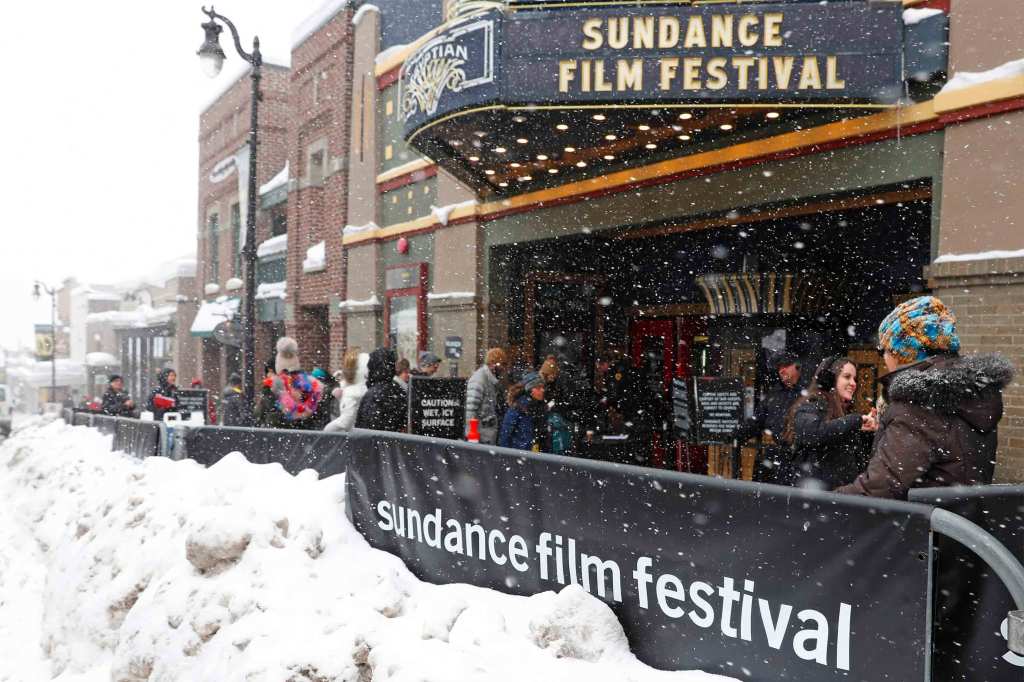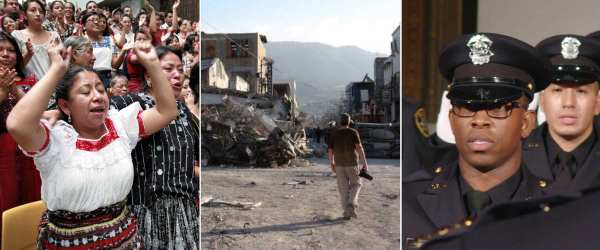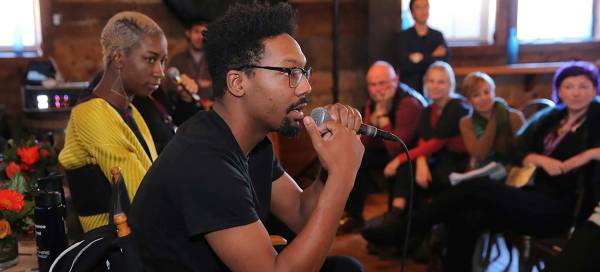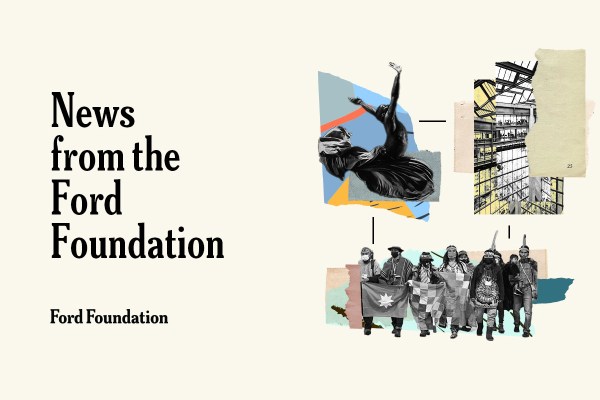 EPA/Newscom
EPA/NewscomThis year’s Sundance Film Festival was unlike any other in my experience, and easily as dramatic as some of the films shown. The 10-day festival in Park City, Utah, featured an epic snowstorm, a curious cyberattack, and a women’s march drawing nearly 10,000 resolute people—the same number as the year-round population of Park City.
But most memorable to me is the way in which artists’ creativity and free expression once again became the center of gravity in a gathering defined by passion, intelligence, commitment, and possibility. The mountains of Utah echoed with stories of struggle and triumph from around the world, binding this annual pop-up cinema village in a renewed commitment to storytelling, the pursuit of justice—and yes, celebration.
JustFilms, part of Ford’s Creativity and Free Expression program, is a longtime partner of the Sundance Institute, which through creative labs and grantmaking is one of the world’s premiere support centers for visionary film and new media artists. This year, JustFilms provided direct support to seven documentary films that premiered at the institute’s signature festival, and regrant support to a number of additional projects. In this global gathering, these films and many others told a shared tale of communities and individuals striving for dignity and opportunity—and how their efforts are all too often thwarted by power structures that reinforce inequality.
The stories on display at Sundance contribute to a different kind of narrative—a narrative of the possible, not the probable or even the predictable—one that reflects the common human desire for respect and opportunity. The projects JustFilms supports are centered on the experiences of communities that have historically had unequal access to telling their own stories. In American cinema, the experiences of black communities have long been rendered invisible or so simplistic or exaggerated as to be unrecognizable. And so we note that African American directors led a powerful showing of emerging and established talent at Sundance this year, including in four of the films supported by JustFilms.
Documentaries that build empathy and bridge divides
Ten years in the making, Strong Island was awarded a special jury prize for storytelling, honoring filmmaker Yance Ford’s profound meditation on his family’s trajectory: fleeing the violence of the Jim Crow South only to be met with violence on the supposedly safe streets of Long Island a generation later. In 1992, Ford’s unarmed 24-year-old brother was killed by a white teenager. Legal justice in the moment was denied, but in an intimate, delicate interlacing of love, grief, and guilt, Ford seeks another kind of justice—that which comes by restoring his brother’s humanity and his family’s dignity by telling their stories. Thus he recovers the beauty of their lives and the strength of their convictions, not in the moment, but for the ages.
Tell Them We Are Rising also frames a historical arc—one into which the family in Strong Island could be fit. Directed by veteran documentary filmmaker Stanley Nelson, the film chronicles 170 years of determination and sacrifice behind historically black colleges and universities in the United States. Advocates and educators overcame intimidation, humiliation, and violence to build these centers of learning, which have become a steady source of African American talent, with alumni leading the country across every field.
The power of multiple stories on a single theme
Whose Streets? and The Force both take up the contemporary African American experience, the former with a focus on the lives of African American residents in Ferguson, Missouri, the latter with an inside look at the Oakland Police Department in California. The two form a serendipitous diptych, each reinforcing the narrative of the other through contrasting perspectives. The films take a vérité approach to reveal the day-to-day realities of communities grappling with overly zealous policing. Each asks its audience to read between the lines and appreciate a perspective that is not often available for the camera: Access to a police force is notoriously hard to gain, and the trust of a local community under siege equally so.
Whose Streets? directed by Sabaah Folayan with co-director Damon Davis, considers the experiences of African Americans in Ferguson after the police shooting of Mike Brown Jr. as residents document and resist the escalating use of force to control the local population and growing protests. Pete Nicks’s The Force, which won a directing award at Sundance, takes us alongside new police officers in the Oakland Police Department as it attempts reform amid cases of corruption and repeated claims of policy brutality.
Though radically different in substance, together the films challenge viewers to question their assumptions, values, and beliefs as they see policing from the vantage point of the enforcers and the enforced. JustFilms funded both documentaries simultaneously, in the belief that supporting multiple stories on a single theme helps to advance the diverse perspectives that are necessary to render today’s complex realities.
Films that traverse the globe
Three other documentaries supported by JustFilms, 500 Years, Bending the Arc, and The Workers Cup, offer a look at communities outside the United States. In Bending the Arc, filmmakers Kief Davidson, Pedro Kos, and Cori Shepherd Stern share the vision and determination behind the nonprofit organization Partners In Health and the movement to make health care a human right. The film spans the 30-year rise of the movement from a rural village in Haiti into what is now a global phenomenon influencing how health care is delivered around the world.
500 Years is the third film of a monumental trilogy about the Mayan people of Guatemala and their resistance to repressive governments, starting with When the Mountains Tremble and Granito. In this latest film, filmmakers Pamela Yates, Peter Kinoy, and Paco de Onis showcase the historic war crimes trial that convicted General Ríos Montt for genocide against the Mayan people, and the subsequent mass movement that came together to remove President Otto Pérez Molina. Ultimately, it is a story of resistance over centuries.
The Workers Cup tells the moving story of a primarily Indian and Asian immigrant labor force contracted to build a stadium in Qatar for the 2022 World Cup. With astonishing access, filmmaker Adam Sobel delivers a portrait of dreams acted on and dreams denied, as we see the reality of the globalization of labor as experienced by workers themselves.
Supporting artistic vision over the long term
Some projects come to fruition only after years of dedication and diversion, and multiple teams. That was true particularly of Strong Island and Bending the Arc, both cases where art and life intertwined for the film’s creators, with the process of filmmaking itself fundamentally changing their trajectory over a decade or more. Both were films I was privileged to support in their earliest days, in various positions across public media, nonprofit arts support, and philanthropy. Seeing them premiere to great acclaim after such a long and often fragile process of incubation and completion was a moving reminder of why it is important to support an artist’s vision over the long term. This is a continuing priority of JustFilms and the Ford Foundation.
Artist-driven films, like those JustFilms supports, contribute to a larger narrative that reflects the common human desire for respect and community. Through these stories, we bear witness to the lives and needs of different communities that are under siege and overcoming significant challenges. Such stories offer us a deeper understanding of the forces shaping these communities’ lives, how the communities might shape those conditions and, in turn, their own lives. That’s why so many of us at Sundance experience the festival as, first and foremost, a place to recognize each other as partners in the act of storytelling from the heart.



